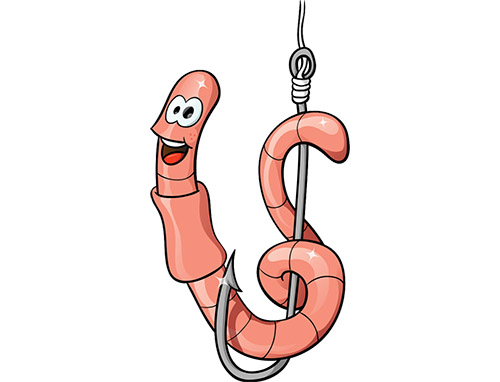
Have you ever been in trouble and then somehow you managed to extricate yourself? In American slang, you’ve gotten “off the hook.” The origins of this phrase date back to the 1800s, and the imagery is of a worm on a hook to be used as bait in fishing. If the worm (or the fish) could get himself “off the hook,” he’d avoid being eaten.
It also relates to telephones, as in “ringing off the hook,” or “taken off the hook,” the hook being a reference to the base supporting the phone. Early telephones had a switch hook on the side which, when the receiver was hung on it, created an electrical circuit which showed the line wasn’t in use, thus allowing calls to come through. When it was “off the hook,” it was occupied, and no calls could get through. People wanting not to be disturbed would take the phone off the hook, and incessant incoming calls were hyperbolically described to be so strong as to knock the receiver off its perch.
Today, a party or performance that is really exciting and cool may be referred to as “off the hook,” perhaps referring back to the fishing analogy of being free of restraint, or the phone comment of being unreachable, as if to say, “You can’t touch this.”
Why all my focus on hooks today? Because I realized just how important they can be through a recent encounter. I don’t mean to say that hooks need to prove their worth, because they don’t. We all know how important they are in closing screen doors, hanging curtains, and as a place to stow your jacket in a hurry. But let me explain.
I was in a rental car not too long ago, and I went to the dry cleaners to pick up my clothing. When I returned to the car, I opened the door behind the driver’s seat and instinctively felt around the top of the door for a hook to hang the clothes on. I slid my hand back and forth a bit until I located it, but there it was, this little folding hook which was perfectly designed to hold hangers so your clothes don’t get wrinkled and you don’t have to lay your jacket as flat as possible in the trunk where it might get dirty.
As I did so, I reflected on the fact that nearly every car has a hook of some sort there. But what does it have to do with the performance of the vehicle? Why would a manufacturer put in something that has absolutely nothing to do with the car’s ability to drive or get its passengers from place to place?
The obvious answer is that though it doesn’t have anything to do with the actual driving of the car, it has everything to do with how the driver of the vehicle will use it in their daily life. Look at cupholders. They are an extremely crucial piece of technology to have in cars and their importance cannot be overestimated. People get thirsty while driving (plus highways’ rest stops have fountain soda – and you can get like three gallons for 50¢) but you can’t drive while holding your cup. TIP: If you’re ever looking at buying a car, make sure the cupholders are on the floor, not in the door. If they are, good luck trying to close the door and not spill your drink!
The same with the hook. You can’t drive while holding your dry cleaning, and you need a safe place to hang things. Because you will need to use it, the car manufacturers put it in the vehicle. Not because it’s intrinsically necessary for driving the car, but because drivers have that need when they are driving.
Often, we come up against people and situations we would rather not face. We find things challenging or annoying and wonder why we have to deal with them. If you ask us, we have no need for this in our lives. But the manufacturer knows better.
He realizes that life is not just about living any more than driving is just about driving. You drive because you’re trying to get someplace, and that’s the reason we’re alive. We’ve got a destination and a schedule and though we’re new to the job, our Boss knows what we need along the way in order to achieve our goals.
The things we find extraneous or unnecessary are actually crucial to our journey and professional growth. That’s why they’re there. What that means is that when we find these situations which seem to be ridiculously pointless, we ought to look a bit harder to figure out what purpose they serve.
If they appear in our lives, it’s because we need them. We can’t just ignore them because otherwise we’ll break down somewhere along the way. And if you think you can look away, let me tell you, you’re not getting off the hook that easily – because unlike the worm or the fish, your life depends on it.
Did you enjoy this column? Feedback is welcome and appreciated. E-mail info@JewishSpeechWriter.com to share your thoughts. You never know when you may be the lamp that enlightens someone else.










